Someone (I’m sorry – I still can’t remember who) wrote: “Our chief task as Orthodox is not to think about Orthodoxy, but to think about the world in light of Orthodoxy”.
Of course we need to know the Faith. However, the Orthodox Faith is a “given”. Orthodoxy is built on the Rock. It doesn’t change. It doesn’t require defending. So, while most Christians today are occupied trying to define or defend what they believe, we Orthodox have the great opportunity to take our Orthodox Faith and do something with it, offer it to the world, challenge the world and its presumptions from the Orthodox point of view.
You regular readers know that, though I do not serve in his jurisdiction, I have long admired His Holiness Patriarch Bartholomew. As Ecumenical Patriarch he has carried Orthodoxy and classical Orthodox principles beyond Church structures and has got involved with the great issues that affect God’s world, God’s people. I’ve enlarged the image below, hoping you can read the fine print. (If you can’t, it says that in 2008 Time Magazine called him one of the hundred most influential people in the world.)
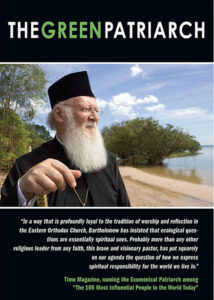
A few examples, among many, of his work in the world:
In 1997 in the U.S. Capitol Rotunda: “he suggested that people in the United States rely more on intellect than on religious belief, to the country’s detriment, and spoke of how many Americans from a ‘generation that worshiped many false idols — from drugs and cults to power and wealth’ — have been drawn to the ‘simple, unadorned faith’ of Eastern Orthodoxy.” Washington Post
On September 24, 2008, he spoke to the Plenary Assembly of the European Parliament during the formal sitting of the assembly in Brussels, Belgium.
In April 2017 he addressed the World Council of Churches, an organization which Orthodox helped to found but which, in Orthodox eyes, has in many ways gone off the track theologically over the years.
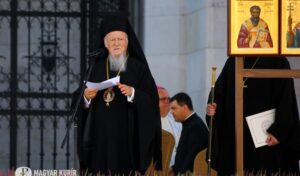 In October 2021 he spoke at the University of Notre Dame, where they listed him with his proper title: “His All-Holiness Bartholomew, Archbishop of Constantinople-New Rome [!] and Ecumenical Patriarch”.
In October 2021 he spoke at the University of Notre Dame, where they listed him with his proper title: “His All-Holiness Bartholomew, Archbishop of Constantinople-New Rome [!] and Ecumenical Patriarch”.
In September 2021 he addressed the International Eucharistic Congress of the Roman Catholic Church in Budapest, Hungary.
In May 2022, he spoke at the “Forum for Promoting Common Values among the Followers of Religions” in Riyadh, Kingdom of Saudi Arabia.
These are only a few instances of his work: Orthodoxy for the world! Orthodoxy visible in the world. Orthodoxy involved in the world.
Nor has he slowed down. At age 83 it seems like almost every week he’s in a different country or two, not only tending to the Flock, but also showing up in some of the most unexpected places, such as this:
On December 8, 2022, His All-Holiness was keynote speaker at the annual meeting of the World Policy Conference * in Abu Dhabi, addressing world leaders from many countries of many faiths – and some of no faith. And that is the speech I want to share with you today.
- “The WPC 2022 brings together top-level decision-makers, academics and opinion leaders who are mainly selected according to their expertise and international exposure.” https://www.worldpolicyconference.com/
- https://en.wikipedia.org/wiki/World_Policy_Conference lists some of the notables who have attended over the years.
The Greek Orthodox Times said he “strongly scolded incidents of religious fanaticism and intolerance, stressing the importance of religion for the peaceful coexistence of peoples and nations”.
The Russian Orthodox Union of Orthodox Journalists wrote: “Addressing the audience in French, the head of the Phanar * called for solidarity, openness, responsibility and joint action, highlighting the importance of dialogue as a means of resolving problems.”
- Note that, in contrast to Notre Dame University (above), the Russian journal describes him not as Ecumenical Patriarch but only as “head of the Phanar”, the district in Istanbul/Constantinople where the patriarchate is located! Such is the deplorable state of the Holy Orthodox Church today.
Not surprisingly he also had a lot to say about Ukraine, and also about the failure of the old secular ideologies in the modern world, and about the need for modern world leaders to grasp the rising role of religion in most of the world today [excepting the modern Western world?].
Agree with him or not, Patriarch Bartholomew is worth hearing. I think you should read the whole speech. Note his broad grasp of history and the forces behind it, and how he doesn’t hesitate to speak plainly about the current disarray within the Orthodox Church
___________________________________________________
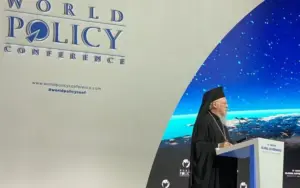
Ladies and Gentlemen,
Dear friends,
We would like to warmly thank the organizers of this new symposium of the World Policy Conference “For a Reasonably Open World”, for inviting us once again to participate in this very interesting work.
The Ukrainian war, provoked by the unjust aggression of Russia in February 2022, constitutes the worst European geopolitical and humanitarian crisis since the end of the Second World War. It is accompanied by the sacrifice of a large number of Ukrainians, Russians and others, as well as the destruction of an entire country. Was such a disaster to be expected?
Specialists in international relations seek to explain this situation by referring to the conditions of the end of the Cold War. Was the West wrong to take advantage of the implosion of the Soviet Union to establish its influence in the East? Has the change in the major balances in Europe reawakened old fears of a possible encirclement of Russia? On the other hand, how can we not take into consideration the desire for independence of peoples who lived under Soviet oppression? How not to respond with acts of solidarity to the culpable abandonment of Eastern Europe to the domination of Moscow in the name of the system of zones of influence established by the Yalta agreements?
This debate is undoubtedly valid. However, the vision of our Church lies beyond these current perspectives. Her gaze is more rooted in history in general and in ecclesiastical history in particular. We consider the source of our misfortunes to be the consequence of errors in judgment regarding matters related to faith. It is for this reason that we identify with the term “orthodoxy,” a just and upright faith.
The Orthodox Church has played a fundamental role in the emergence of these two realities, both separate and intertwined, which are Russia and Ukraine. The place of the drama is at the intersection of a double crossroads, Europe and Asia. First of all, there is the isthmus between the Baltic Sea and the Black Sea, an essential axis for trade between Northern Europe and the Eastern Mediterranean. Perpendicular to this corridor, in the southern part of present-day Ukraine, a corridor is formed open to the circulation of peoples, through which several successive invasions have passed. The commercial function allowed the structuring of powers and the opening to civilization and to the outside world. The waves of invasions and the covetousness of the surrounding powers have, on the other hand, often undone the political structures and subjected the populations to enormous suffering. It is this dialectic between construction and destruction that explains the emergence of a Ukrainian identity.
The spatial political map of present-day Ukraine has changed shape many times over the centuries, from Kievan Rus in the 9th century to Catherine II in the 18th century, when most of Ukraine found itself integrated into the Russian Empire. Over the centuries, the populations of Ukraine have been subjected to successive foreign dominations: Russian, Polish, Mongol, Lithuanian or Austrian. *
- See https://www.washingtonpost.com/news/worldviews/wp/2015/03/09/maps-how-ukraine-became-ukraine/
The 20th century was particularly hard on Ukrainians. They endured the great Stalin-era famine, Holodomor,*and found themselves in the midst of armed confrontation between the Soviet Union and Nazi Germany during World War II.
- The Ukrainian word for “death by hunger” “starvation” It refers to the intentional starvation of between four and seven million Ukrainians in 1932–33 as a result of Soviet policies. The Holodomor was the culmination of an assault by the Communist Party and Soviet state on the Ukrainian peasantry, who were resisting the Soviet drive to force them out of their homes onto collective farms.
This history explains the desire to differentiate itself from the Russian whole and to connect with Europe and its values. These conditions also make it possible to understand the importance of religion, an element that is both founding and liberating of Ukrainian consciousness. From Constantinople, the Ecumenical Patriarchate introduced Christianity and Byzantine civilization already in the 9th century to the peoples of this region. We played a fundamental role in the organization of the religious communities that formed around the Metropolis of kyiv, and then around the Patriarchate of Moscow.
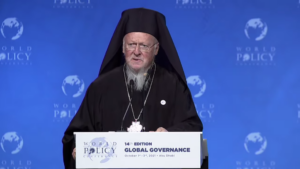
However, its teachings regarding the rules of organization and ecclesiastical functioning, inherited from the long history of Christianity and which reflect all the administrative and philosophical wisdom of the world of the Eastern Mediterranean, have not always been respected by Moscow. The imperial power wanted to submit the church to its will in its effort to instrumentalize the religious feeling for its political and military ends. Thus, from the capture of Constantinople by the Ottomans in 1453, Moscow aspired to replace the Ecumenical Patriarchate by proclaiming that Moscow represented “the third Rome”. This long-lasting policy of Moscow constitutes a fundamental factor of division of the Orthodox world.
From the 19th century, the instrumentalization of religion by Moscow was combined with the innovative ideas of German nationalism. Inspired by Pan-Germanism, the new ideology of Pan-Slavism, an organ of Russian foreign policy, acquired a religious component. This is the idea that churches should organize themselves according to the principle of ethnicity, the central marker of which would be language. It is this approach that the Ecumenical Patriarchate of Constantinople denounced in 1872 as heresy (the heresy of ethnophyletism, a form of ecclesial racism). It is in flagrant contradiction with the universalism of the Gospel message, as well as the principle of territorial governance which defines the organization of our church.
This heresy was, however, useful to Moscow’s objectives since it distanced Slavic-speaking believers from the influence of the Ecumenical Patriarchate. The aim of this strategy was to create, within the Ottoman Empire, and later in the form of an independent state, a separate political force, at the service of the Russian thrust towards the warm seas. She is responsible for the hatreds between Balkan Christians that led to the Balkan wars and atrocities of the early 20th century.
During the Soviet Union, religion was marginalized and oppressed. Communist ideology had occupied the terrain attributed to the screen to a religion exploited by the Tsarist Empire. After its fall, the faith was again used for ideological purposes. The Russian Orthodox Church has sided with the regime of President Vladimir Putin, especially since the election of His Beatitude Patriarch Kirill in 2009. It actively participates in the promotion of the ideology of Rousskii Mir, of the Russian world , according to which language and religion make it possible to define a coherent whole encompassing Russia, Ukraine, Belarus as well as the other territories of the former Soviet Union and the diaspora. Moscow (both political power and religious power) would constitute the center of this world, whose mission would be to combat the decadent values of the West. This ideology constitutes an instrument of legitimization of Russian expansionism and the basis of its Eurasian strategy. The link with the past of ethnophyletism and the present of the Russian world is obvious. Faith thus becomes the backbone of the ideology of Putin’s regime.
The autocephaly of the Ukrainian Orthodox Church granted in 2019 by the Ecumenical Patriarchate has worsened relations with the Russian Church. Here we find tensions already expressed, when the Patriarchate of Moscow decided not to participate in the Holy and Great Council of the Orthodox Church gathered in Crete in 2016.
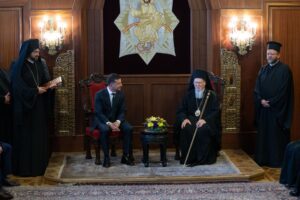
The invasion of Ukraine on February 24 pushed the polarization to a fever pitch. Patriarch Kirill’s ambiguous stance on the war and support for President Putin’s policies have provoked strong criticism within the Orthodox world and beyond. The Orthodox of Ukraine, who had chosen to remain under the tutelage of the Russian Church, also expressed their disapproval.
Thus, the division of the Orthodox world deepens and expands. Some Churches agree with the Ecumenical Patriarchate; others, whose countries are too dependent on Russia, blindly support the Moscow Patriarchate; still others prefer to keep a complicit silence. Meanwhile, the Russian Church uses the means of the state to establish its influence on the canonical territory of other Churches, despite the most elementary rules of the ecclesiastical organization of Orthodoxy. Its interferences in Africa are presented as punitive actions against the Patriarchate of Alexandria for the recognition of the autocephaly of the Orthodox Church of Ukraine. It is obvious that in these conditions, the peacemaking role of the Church becomes very difficult.
What does this mean for debates beyond church circles? It shows once again the growing role of the religious factor in major global issues. Ideologies are weakening one after another. The end of communism left a great void in a whole part of the world that lived under its domination and in other populations that had invested their hopes in it. The crisis of globalization and liberalism is also creating deep frustrations and dangerous resentments. In this landscape of collapsing materialist ideologies, the spiritual is making a strong comeback. However, this return can constitute a danger, if it is not expressed according to approaches integrating the wisdom of religious traditions drawn from the heritage of the great civilizations of the past.
Errors in discernment, heresies, are not insignificant phenomena that interest only a few clerics and a few scholars. On the contrary, they have very serious consequences for the spiritual life and for material life. The source of the problems is the instrumentalization of religion by actors who often have no real faith.
The Russian Orthodox constitute a great wealth for Orthodoxy and for the whole world. Russian Orthodoxy offered an enormous intellectual, spiritual and artistic contribution. It was unfortunately the victim of interference from Russian political power. Soviet oppression wreaked havoc, depriving entire generations of the blessings of the Church’s faith and wisdom. The neo-imperial regime, in its need to strengthen itself, drew on what seemed to it to be precious political capital: the renewed religious sentiment of the Russian people. Unfortunately, it was able to lead part of the Orthodox clergy on this path. Above all, it took up and reinforced the heretical approaches of the Tsarist regime in a context of poor knowledge of ecclesiastical rules, due in part to the spiritual decay of the Soviet period.
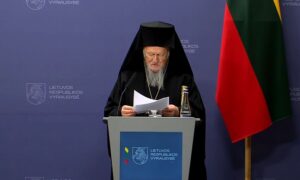 The consequences are very serious. The ethno-religious fanaticism inculcated in Russian youth stifles prospects for peace and reconciliation. The Orthodox world is divided and this fragmentation is projected onto poor countries, whose people hoped to find relief in the faith. Above all, it harms the Russian Church since sooner or later the people will realize the excesses of a Church subject to objectives that have nothing to do with its original mission.
The consequences are very serious. The ethno-religious fanaticism inculcated in Russian youth stifles prospects for peace and reconciliation. The Orthodox world is divided and this fragmentation is projected onto poor countries, whose people hoped to find relief in the faith. Above all, it harms the Russian Church since sooner or later the people will realize the excesses of a Church subject to objectives that have nothing to do with its original mission.
Ladies and gentlemen, dear friends,
Specialists in international relations sometimes tend to ignore or marginalize the role and significance of the religious factor, authentic or manipulated. We have, however, entered a period in which this factor is becoming increasingly important. Theologians and other specialists in questions having to do with the functioning of the Churches must undoubtedly open up to other perspectives and develop dialogue with other scientific disciplines. It is also important that specialists in the social sciences, political sciences and international relations overcome a certain hesitation to deepen religious questions. The understanding of a new world that is being formed before our eyes cannot disregard the religious fact.
Thank you for your attention!
Next Week: What I’ve learned in 85 (!) years. (A short post?)
Week after Next: I’m pretty sure I know what, but I’m still debating it.
I have read a lot of Orthodox blogs about the war in Ukraine from different sides and statements from the national and church leaders. I have gained some insight from them on the political issues. But that’s the thing. Political issues. The tone of these statements is no different from secular political commentary. Only the subject matter is a bit different, since it focuses more on the Church.
Politics is important, yes, but surely we as Orthodox know that things are really happening at another level. Surely, we must realize that this is an attack of Satan upon the Body of Christ. Satan failed to destroy the churches of Russia and Ukraine by communist persecution. Now Satan is causing Orthodox brothers to kill brothers and dividing the rest of the Orthodox world through this war.
Yet, neither in this statement by Bartholomew nor statements I have read by Kirill, among others, do I see a call to prayer or an appeal to Jesus Christ. If we had real Christian leadership anywhere in the Church, they would be calling for fervent repentance and united prayer for peace, Regardless of our political opinions, surely we can agree that we want peace. All the Orthodox jurisdictions should unite in repentance and prayer for peace. If even “enemy” jurisdictions can unite in praying for peace, Our hierarchs should reach out and agree that differing opinions on worldly politics, or even personal feelings toward each other, cannot stop them from uniting to pray for peace. Otherwise, if those are barriers to uniting in love, what kind of Christians are they? This should be seen as an emergency in the Orthodox Church. We need to close ranks against the actual Enemy who is attacking the Church. In a war between the two largest Orthodox countries in the world, surely Jesus Christ will be the key to peace.
Thank you, Gayle, for a very thoughtful comment. I agree that behind this war is Satan, the source of all evil, who seeks to destroy the Church and her witness. The problem: Perhaps the man who has called most for prayers for peace is Patriarch Kirill, who then supports the invasion of Ukraine and the destruction of that country and the horrible suffering of the Ukrainian people. I don’t know what it means to unite with that kind of prayer
Well written comment. Thank you, for doing so, Gayle.
Thanks for the comment. I guess it all depends on one’s view of the place of the Ecumenical Patriarch. However, as I recall, it was Patriarch Kyril who withdrew from Communion with Patriarch Bartholomew, not the other way ’round. And it was Russia which invaded Ukraine, not the other way ’round. It is Russia which daily is destroying Ukrainian civilian targets – apartment buildings, schools, hospitals, churches. Ukraine is not doing the same to Russia. The invasion has been condemned even by Patriarch Onuphrius of the Ukrainian Orthodox Church (Moscow Patriarchate). Those things we know for certain. Beyond that, much of the truth of what is actually happening within Ukraine is presently lost to us in what Winston Churchill called “the fog of war” and won’t be known till the war ends – and I think there’s a very simple way for that to happen.